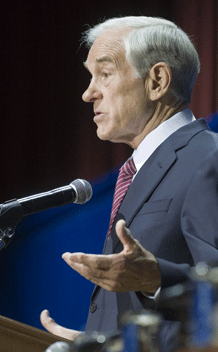Campaign 2012 Roundup: Is Foreign Policy a Problem for Ron Paul?
More on:

A common trope so far in campaign 2012 is the argument that Republicans have turned isolationist. Someone apparently forgot to tell voters in Iowa. Polls currently have Ron Paul running fourth there. Today’s Wall Street Journal reports that what’s hurting him with many Iowa Republicans is his non-interventionist foreign policies.
Dusty Juhl, a supporter of Mr. Paul in Iowa working for a libertarian-leaning group, estimated that 90% of the people he contacts raise concerns about the congressman’s foreign-policy views.Mr. Paul illustrated the possibilities and limits of his campaign during a visit to a Warren County Republican breakfast here recently. He sent the room into broad applause when he reminded the audience that he has long called for closing the U.S. Department of Education—a pet cause of politically active home-schoolers. But the reaction was more muted when Mr. Paul switched to troop deployments.
"We spend way too much money overseas, so I’d start by bringing the troops home from around the world," Mr. Paul said. About half the audience clapped. The other showed no visible reaction.
The reservations that Iowans have about Paul’s foreign policy views are striking. Why? Because the Midwest has historically been a stronghold of isolationist sentiment in America, and Iowa is the most Midwestern of states. (Indeed, Hollywood delights in movies in which Iowans are reluctant to go to war.) So perhaps “isolationism” doesn’t quite capture the complexity of the debate within the Republican Party on foreign policy.
Not everyone is alarmed by Paul’s foreign policy views. Conor Friedersdorf believes they are more mainstream than those his opponents espouse. Charles Krauthammer is not buying that argument. He blasts Paul for “living in the 20s [and thinking] we can have a moat around the United States and if we ignore the world, the world will ignore us.”
Paul isn’t the only GOP candidate in the news for his foreign policy views. Herman Cain used his appearance yesterday on CNN’s “State of the Union” to reiterate his opposition to President Obama’s plans to draw down troops in Afghanistan and Iraq. Not surprisingly, he added that “I feel strongly that we should stand with Israel.” The Washington Times thinks that Cain’s approach to foreign policy is reminiscent of Ronald Reagan in 1980.
Les Gelb, CFR’s president emeritus, worries that Republican presidential candidates are looking backward to a “bygone world of dire military threats” rather than forward toward the new truth of world politics—economics matters. Looking back at the CNN presidential debate last week, Gelb observes:
The real shocker was how all those candidates, save for [Ron] Paul and [Jon] Huntsman, almost totally neglected the now-central economic dimension of international affairs. Only those two noted the new reality of world politics—that economic strength now matters more than military might.
The gathering eurozone crisis may force the GOP presidential hopefuls to address the topic of international economics, regardless of whether they are ready to or not.
More on:
 Online Store
Online Store